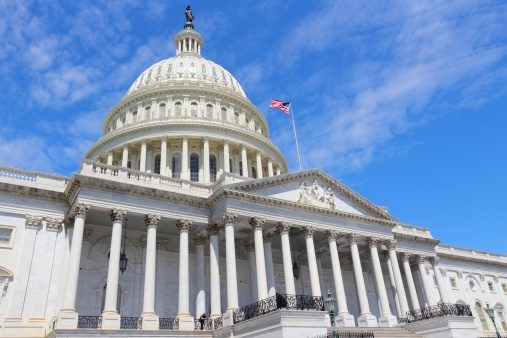On the beautiful afternoon of April 8 in Washington, D.C., the Natural Products Association (NPA) held its 17th annual Natural Products Day. The event is designed to allow retailers and other natural products industry stakeholders to lobby their elected representatives on behalf of the industry’s interests.
A bright, sunny day welcomed attendees to Capitol Hill, where flowers were just beginning to bloom. It felt like the first day of spring, and this was fitting, as it is a time of new beginnings for NPA and its efforts to lobby on behalf of the natural products community. Longtime Congressional allies of the industry have reached or are nearing the ends of their runs in politics. Namely, Sen. Tom Harkin (D-IA), a staunch defender of the industry who helped pass the Dietary Supplement Health and Education Act (DSHEA) in 1994, is set to retire at the end of this term. Sen. Orrin Hatch (R-UT), also a legislative ally formany years and an architect of DSHEA, has said he will retire after one more term if he wins reelection in 2014.
So, to continue to advocate for and fight legislative battles that impact natural products, the industry must cultivate relationships with new champions. One prospect is the Democratic junior senator from New Mexico, Martin Heinrich, who spoke to NPA’s group on the morning of the lobbying event. “One of the first things we did when we moved to Albuquerque was join our local food co-op,” Heinrich said, before going on to convey a deep understanding and appreciation of the industry’s importance and recent growth. “It really represents a sea change in the American public, in how we approach health in our lives,” he said.
This year’s event also marked a change at the helm of NPA, as the association welcomed a new CEO and executive director in Daniel Fabricant, Ph.D., for whom the position is a sort of homecoming. He most recently worked at the U.S. Food and Drug Administration (FDA) for three years as the director of the Division of Dietary Supplement Programs, but before that, he was vice president of global government and scientific affairs for NPA. As a now former federal regulator, Fabricant will bring a unique perspective to NPA’s efforts to secure the industry’s interests.
The task of lobbying itself allows NPA members, from retailers to manufacturers to brokers, to present a unified message to their local representatives. In meetings with these elected officials, and more often their staffers, attendees from around the country were encouraged to drive home key points about pending legislation, as well as forge a relationship with the representatives. Manufacturers routinely invited representatives out to their facilities, and retailers extended invites to their stores.
They also urged their representatives to consider joining the Dietary Supplement Caucus, used to educate lawmakers about the benefits of dietary supplements and promote research. The list of senators and representatives who attend this caucus has grown to almost 30. In the morning’s briefing session on “How To Lobby,” a former legislative aide told the group the importance of following up on these meetings, as it helps create actual action on the issues discussed.
The legislative items on this year’s docket included the Designer Anabolic Steroid Control Act, The Genetically Engineered Food Right-to-Know Act, and the Dietary Supplement Labeling Act (DSLA). The Steroid Control Act is supported by NPA, as it would allow the Drug Enforcement Agency to more effectively keep anabolic steroids out of the market for safe dietary supplements.
The Right-to-Know Act, introduced by Sens. Barbara Boxer (D-CA) and Peter DeFazio (D-OR), would create a federal standard for the labeling of genetically modified organisms (GMOs) in food. The NPA supports this solution over the potential for a patchwork of laws taking effect in various states. NPA also urges FDA to review its position that GMOs are “bioequivalent” to conventional food. But those lobbying were instructed to not get bogged down in a debate over the science, and instead focus on the consumer’s right to know what is in their food.
Meanwhile, NPA continued its opposition of the Dietary Supplement Labeling Act, reintroduced by Sens. Richard Durbin (D-IL) and Richard Blumenthal (D-CT). It is seen as a threat to the industry because it would grant FDA new powers and create new requirements for supplements entering the market. NPA wanted lobbyists to point out that an extensive and adequate regulatory framework already exists for supplements, including current good manufacturing practices (cGMPs) and adverse event reporting, and that this bill would create redundant and burdensome rules.
WholeFoods directly observed meetings with the offices of Rep. Cathy McMorris Rodgers (R-WA), Rep. Rush Holt (D-NJ), Sen. Marco Rubio (R-FL), Rep. Tammy Duckworth (D-IL) and Rep. Frank Pallone, Jr. (D–NJ). Duckworth said that her meeting with several people from NOW Foods, who also happen to be constituents, reinforced the notion that there are many good actors in the industry who adhere to existing safety regulations. After discussing NPA’s opposition to DSLA, Duckworth said, “People may not realize the high quality of certain facilities. The industry isn’t asking to get rid of regulations; they just want them to be fair.”
Pallone is also seen as an ally of the industry, and a contingent from New Jersey engaged him and his staff in a lengthy discussion on the GMO labeling issue. After meeting with Rubio’s staffers, Leslie Patterson of Florida brokerage Hoppy & Co. remarked that the staffers were very receptive and aware of the size of the industry. “Life is about relationships,” Patterson said with regard to the lobbying effort. “The thing that we can do better is to keep in touch throughout the year.”
At an evening reception to honor the industry’s supporters in Congress, the retiring Harkin said that the industry, to him, represents the movement from a “sick care” system to a true health care focus for our society.
Published in WholeFoods Magazine, June 2014 (online 5/2/14)










